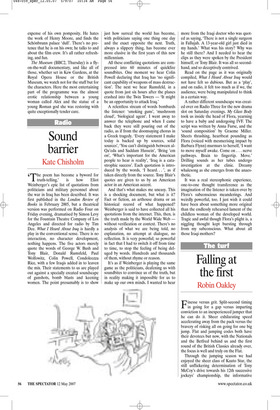Radio
Sound barrier
Kate Chisholm
‘The poem has become a byword for truth-telling,’ is how Eliot Weinberger’s epic list of quotations from politicians and military personnel about the war in Iraq has been described. It was first published in the London Review of Books in February 2005, but a theatrical version was performed on Radio Four on Friday evening, dramatised by Simon Levy for the Fountain Theatre Company of Los Angeles and directed for radio by Tim Dee. What I Heard About Iraq is hardly a play in the conventional sense. There is no interaction, no character development, nothing happens. The five actors merely quote the words of George W. Bush and Tony Blair, Donald Rumsfeld, Paul Wolfowitz, Colin Powell, Condoleezza Rice, with a few Iraqis added in to leaven the mix. Their statements to us are played out against a specially created soundscape of gunshots, bomb blasts and keening women. The point presumably is to show just how surreal the world has become, with politicians saying one thing one day and the exact opposite the next. Truth, always a slippery thing, has become ever more elusive in the first years of this new millennium.
All these conflicting quotations are compressed into 60 minutes of quickfire soundbites. One moment we hear Colin Powell declaring that Iraq has ‘no significant capability of weapons of mass destruction’. The next we hear Rumsfeld, in a quote from just six hours after the planes crashed into the Twin Towers — ‘It might be an opportunity to attack Iraq.’ A relentless stream of words bombards the listener: ‘smoking guns’, ‘mushroom cloud’, ‘biological agent’. I went away to answer the telephone and when I came back they were still pouring out of the radio, as if from the doomsaying chorus in a Greek tragedy. ‘Every statement I make today is backed up by sources, solid sources’, ‘You can’t distinguish between alQa’eda and Saddam Hussein’, ‘Bring ’em on’, ‘What’s important for the American people to hear is reality’, ‘Iraq is a catastrophic success’. Each quotation is introduced by the words, ‘I heard... ’, as if taken directly from the source. Tony Blair’s quotes are given to us by an American actor in an American accent.
And that’s what makes me uneasy. This is a shocking document, but what is it? Fact or fiction, an arthouse drama or an historical record of what happened? Weinberger is said to have collected all his quotations from the internet. This, then, is the truth made by the World Wide Web without verification or context. There’s no analysis of what we are being told, no explanation, no attempt at dialogue, no reflection. It is very powerful; so powerful in fact that I had to switch it off from time to time, to stop the feeling of being deluged by words. Hundreds and thousands of them, without rhyme or reason.
It’s as if Weinberger is playing the same game as the politicians, deafening us with soundbites to convince us of the truth, but in reality making it impossible for us to make up our own minds. I wanted to hear more from the Iraqi doctor who was quoted as saying, ‘There is not a single surgeon in Fallujah. A 13-year-old girl just died in my hands.’ What was his story? Why was he still there? And I needed to hear the clips as they were spoken by the President himself, or Tony Blair. It was all so secondhand, and so deceptively contrived.
Read on the page as it was originally compiled, What I Heard About Iraq would not have felt so dubious. But as a ‘play’, and on radio, it felt too much as if we, the audience, were being manipulated to think in a certain way.
A rather different soundscape was created over on Radio Three for the new drama slot on Saturday evenings. My Glass Body took us inside the head of Flora, yearning to have a baby and undergoing IVF. The script was written by Anna Furse, and the ‘sound composition’ by Graeme Miller. Sheets thrashing, heartbeat pounding as Flora (voiced with mesmerising impact by Barbara Flynn) murmurs to herself, ‘I want to move myself awake. Come on ... nerve pathways. Brain to fingertip. Move.’ Drilling sounds as her tubes undergo investigation at the clinic. Dreamy whalesong as she emerges from the anaesthetic.
It was a real stereophonic experience, one-to-one thought transference as the imagination of the listener is taken over by Flora’s subconscious meanderings. And weirdly powerful, too. I just wish it could have been about something more original than the endlessly rehearsed lament of the childless woman of the developed world. Tragic and awful though Flora’s plight is, a niggling thought kept bursting through from my subconscious. What about all those Iraqi mothers?










































































 Previous page
Previous page